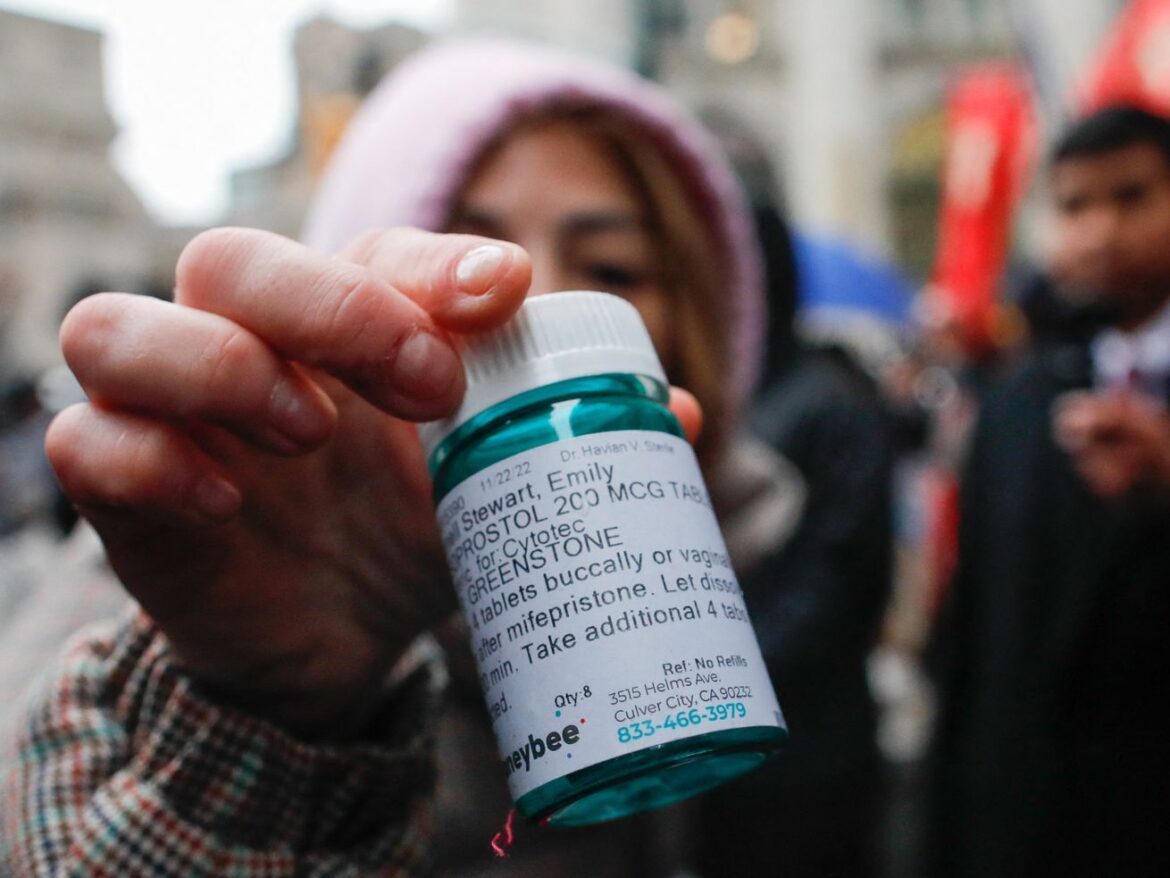Of course pregnancy isn’t a disease.
Anti-abortion activists have been using a deeply misleading refrain to squash access to mifepristone, a drug approved in 2000 by the US Food and Drug Administration (FDA) to safely end pregnancies.
“Pregnancy is not an illness,” declared Erik Baptist, the lead counsel for the coalition of anti-abortion groups Alliance Defending Freedom, in a hearing before Judge Matthew Kacsmaryk in a federal district court in Texas last month. “Pregnancy is not a disease.”
Last Friday night, when Kacsmaryk issued his unprecedented decision ordering mifepristone to be pulled from the market, the anti-abortion judge said the same thing: “Pregnancy is not an ‘illness,’” Kacsmaryk emphasized in his 67-page order, writing that it’s “a natural process essential to perpetuating human life.”
The argument matters because anti-abortion leaders claim the FDA illegally approved mifepristone through an accelerated drug reviewal process known as Subpart H that only applies to “new drugs for serious or life-threatening illnesses.” If pregnancy isn’t an illness, their logic goes, then mifepristone shouldn’t have been approved at all.
It’s a silly argument that reflects both an unreasonably textualist interpretation of the law, as well as a Christian view that pregnancy is holy and stopping it is sacrilege. It’s a shoddy legal interpretation because there’s a long history of the FDA using the terms illness, disease, and condition interchangeably. In an amicus brief filed in the case in February, 19 US food and drug scholars from 16 academic institutions across the United States emphasized mifepristone has always been lawfully approved.
“Although amici represent a diverse range of ideologies and do not necessarily agree on all moral and ethical questions associated with abortion, [we] uniformly agree that Plaintiffs have gravely mischaracterized U.S. federal food and drug law,” the experts wrote.
This isn’t the only time the anti-abortion movement has turned to the “pregnancy is not an illness” rallying cry to fight back against reproductive health care. Back in 2011, when the Institute of Medicine recommended that contraception be covered without co-pay under private health insurance plans, anti-abortion activists strongly objected under these same terms.
“Pregnancy is not a disease, and fertility is not a pathological condition to be suppressed by any means technically possible,” said the chair of the Committee on Pro-Life Activities of the United States Conference of Catholic Bishops at the time. “Contraception only prevents disease or serious illness if one considers pregnancy to be a disease or serious illness,” echoed Bob Laird, a fellow at Human Life International.
It’s exhausting that we have to litigate this point at all because federal regulators never claimed that pregnancy was an illness. Pregnancy is a medical condition — which the FDA lawfully regulates drugs and devices for. (See also: FDA-approved pregnancy tests.)
Mifepristone is one of the most heavily studied and scrutinized drugs in the US, and has been repeatedly assessed and affirmed for its safety and value. It has been used by over 5 million women in the United States since it was approved for use 23 years ago.
“The ironic thing about the [Alliance Defending Freedom] lawsuit is the FDA used Subpart H because it was trying to restrict mifepristone more onerously,” said Greer Donley, a professor at the University of Pittsburgh School of Law. “So [to] the extent that the FDA was trying to do anything sneaky using Subpart H, it was doing it to over-regulate mifepristone, not under-regulate it.”
Explaining the weak “Subpart H” argument
The FDA has emphasized in its agency guidance that when referring to drugs and biologics for serious conditions, it uses the terms condition, disease, and illness “interchangeably.”
By disregarding this, the anti-abortion movement avoids reckoning with the reality that pregnancy is an objective medical condition that falls under the FDA’s legal purview. (Even anti-abortion activists admit pregnancy can cause many serious and life-threatening complications, including preeclampsia, placental abruption, venous thromboembolism, and postpartum depression.)
Back in 1992, the FDA approved new regulations to govern the approval, use, and distribution of drugs for “treating serious or life-threatening illness.”
One section of these regulations — Subpart H — outlines the conditions needed to assure safe use for the drugs. The fact that the text doesn’t explicitly say “condition,” anti-abortion lawyers argue, is proof of a smoking gun. But in its preamble to the final rule establishing Subpart H, the FDA says the regulation applies “to conditions or diseases that can be serious for certain populations or in some or all of their phases.”
As the 19 food and drug scholars outline in their amicus brief, when Congress incorporated this Subpart H regulation as a new section of the Federal Food, Drug, and Cosmetic Act in 1997, federal lawmakers did so in a section applied to products “intended for the treatment of a serious or life-threatening condition.” In other words, there were multiple examples of Congress and the FDA using this interchangeable “disease” and “condition” interpretation.
In 2000, the FDA approved mifepristone under Subpart H and required the abortion medication to be provided by physicians and only distributed in person. Seven years later, when Congress authorized the FDA to regulate certain drugs under a Risk Evaluation and Mitigation Strategies (REMS) list, a designation that allows for additional restrictions if the government determines that increased barriers are necessary for a drug’s benefit to outweigh its risks, Congress codified that REMS is used for drugs for “a disease or condition.” The FDA has since had mifepristone on its REMS list, even though groups like the American College of Obstetricians and Gynecologists argue these additional restrictions are unnecessary.
“Subpart H was a precursor to the REMS program in 2007, and that law explicitly said ‘conditions’ in its operative section,” said Donley. “The plaintiffs just want to ignore how the FDA has long interpreted the word.”
In his decision, Judge Kacsmaryk claimed that mifepristone was illegally approved under Subpart H in 2000, partly because pregnancy is so distinct from the other conditions that drugs were approved for it under this regulation. More than half of the drugs approved under Subpart H by 2002 were for the treatment of HIV and HIV-related disease, while nine were for cancers and cancer symptoms, four were for bacterial infections, one was for leprosy, and one was for chronic hypertension. “One of these things is not like the others, one of these things just doesn’t belong,” snarked Kacsmaryk in his legal order, literally citing: “See Sesame Street.”
The “pregnancy is not a disease” line is just a straw man
You should expect to hear the slogan “pregnancy is not an illness” more often from anti-abortion leaders going forward as they continue to fight against abortion pills and contraception. Indeed, Alliance Defending Freedom’s senior counsel Erin Hawley said it on Monday, following news that the Biden administration had appealed Kacsmaryk’s order in the federal Fifth Circuit. “Pregnancy is not an illness, and chemical abortion drugs don’t provide a therapeutic benefit,” Hawley argued in a statement.
It’s not hard to understand why anti-abortion activists like the phrase so much. It doesn’t sound overtly religious at first blush, and it can come off as even vaguely feminist if you believe that women’s bodies and women’s health care have long been disrespected and disregarded by society and medical professionals.
But on the FDA’s terms, it’s not a serious argument. Mifepristone is an FDA-approved drug to end a pregnancy, and the FDA has approved multiple forms of birth control to prevent pregnancy in the first place. Pregnancy is a condition the FDA is lawfully authorized to regulate drugs and products for, and any arguments about curing or preventing the “disease of pregnancy” are bogus and just meant to inspire confusion.



